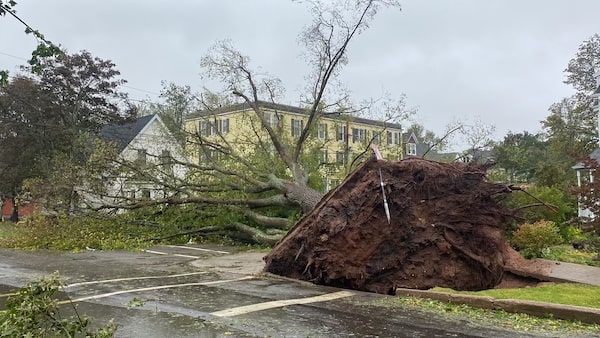Hundreds of thousands of people on the East Coast were left without power, as trees were pulled from the ground and houses were ripped in half by the devastating winds of post-tropical storm Fiona. In some of the hardest hit regions of Atlantic Canada, entire homes were swept out to sea. As the military and Red Cross prepared for an unprecedented cleanup, neighbours and volunteers came to each other’s aid in smaller ways, beginning the long recovery and rebuilding process.
Some stories of resilience, from across the region.

Samantha Murphy (center) and her wedding party prepare for her wedding a day after post-tropical storm Fiona swept through Sydney, N.S.Samantha Murphy/Handout
‘We’re going to have whatever party we can have until the battery dies on the speaker’: Couple proceeds with wedding amid storm
In the week leading up to her wedding, Samantha Murphy did that thing every bride does where she routinely checked the weather forecast for her big day. One of the worst storms to ever hit Atlantic Canada was in the forecast, expected to make landfall hours before she and her fiancé Richard Wood – both paramedics – were supposed to exchange vows in Sydney, N.S.

Samantha Murphy (right) gets her makeup done by Carla Jabalee ahead of her wedding, a day after post-tropical storm Fiona swept through Sydney, N.S.Samantha Murphy/Handout
The couple, engaged since 2019, had already postponed their wedding once because of COVID-19 and after Saturday’s stay-at-home order was lifted, they decided to push ahead with their wedding Sunday, one day late. Mr. Wood’s family and some of the couple’s friends had flown in from Ontario earlier in the week –rescheduling was off the table.
Sydney suffered some of the worst destruction in the province from the weekend’s storm, though members of the bridal party were among the lucky ones whose homes weren’t too badly damaged. Most in the area still didn’t have power but the couple, the majority of their 130 guests and all their vendors were determined to make the nuptials work – with a few modifications.
The caterer would prepare roast beef dinner in a facility with a generator and because their DJ was stuck in Halifax, they’d eat and dance to music from a Spotify playlist pumped through a battery-powered speaker.
“We’re going to have whatever party we can have until the battery dies on the speaker,” said Ms. Murphy on Sunday afternoon, camped out in the hallway of the local Holiday Inn where her bridal party had commandeered the one functioning electrical outlet to plug in a curling iron to do their hair and a glue gun for Ms. Murphy to prepare boutonnieres for the groomsmen.
Their venue, a converted church, doesn’t have electricity, but it’s allowed for an even more romantic atmosphere, Ms. Murphy said – the ceremony and dinner will be illuminated by more than 100 candles.
Her husband-to-be is most relieved that there won’t be any power to allow for a microphone, she said.
“He was really nervous about having that many people at the wedding and it’s going to be a bit smaller now,” Ms. Murphy said. “As much as he wants to marry me, he’s like, ‘Oh, people are going to hear me talking!’”

Courtenay Hemphill, a teacher in Charlottetown, says her family's cars were crushed by a fallen tree during post-tropical storm Fiona in PEI.
‘If they can help, they will help’: PEI communities come together after the storm
Courtenay Hemphill, a teacher in Charlottetown, said the storm had been the talk of the island in the lead-up to the weekend, and it was worse than they could have imagined.
Their cars were crushed by a 200-year-old tree that was ripped from the ground out in front of their Brighton-area home. And at their cottage on the north shore, she figures they lost 20 feet of property from erosion. Their deck and stairs were swept out to sea. But she’s been touched by the community’s efforts to help one another.
“I mean, gotta love the East Coast,” she said. “Walking around, everyone’s on the street right now. Everyone with a chainsaw is out helping one another. Our neighbour right now is out there trying to free our cars. There’s probably 15 people just helping us. If they can help, they will help. … It’s just an incredible place to live.”
She is grateful that her family and neighbours are all safe. But she has been struck by the number of centuries-old maple and linden trees that have been lost.
“I just really feel so sad for the trees. … It’s going to be a different Charlottetown, and a different Prince Edward Island, because so many of the trees are gone,” she said. “I can replace my car, but I can’t replace the tree that grew for 200 years on our property.”
Velda Tapp-Pretty/Handout
‘I looked out the window and the siding was going just like confetti at a wedding,’ says Newfoundlander whose home was hit by wall of water
Velda Tapp-Pretty was asleep at 8 a.m. Saturday when a wall of water slammed into her bedroom window. For several minutes, it was like her home in Channel-Port aux Basques, N.L., was submerged in the middle of the ocean. She could smell it – seawater surging through the foundation, up into the bedroom of her small bungalow. Boulders the size of garbage cans flew out of the ocean, into the air and landed in her backyard.
Post-tropical storm Fiona hits Port aux Basques, NFL, on Saturday Sept. 25, 2022. Courtesy of Velda Tapp-Pretty.Velda Tapp-Pretty/Handout
“It was vicious,” she said. “You could hear the roar and the ripping and I looked out the window and the siding was going just like confetti at a wedding.”
When Ms. Tapp-Pretty opened up the door of her home, she didn’t recognize her street: The newly built apartment building across the road was gone, swept out to sea. The roof on the house next door to her flapped in the wind. Another house was cracked in half. Boats and ships were in the middle of the street in the town of 4,500 on the southwestern tip of Newfoundland.
“One wave took everything,” she said. “It’s total destruction.”
Ms. Tapp-Pretty got in her SUV. A roof in the middle of the road blocked her way, so she wove her Chevrolet Equinox through backyards and roads littered with televisions, mattresses and microwaves until she made it safely to her brother’s home.
There she began messaging with her neighbours, who had left their homes earlier. They wanted to know if their houses were still standing. She didn’t want to be the one to tell them. They were like family – the people who shovelled her snow in winter and shared home-cooked food with her.
“Everybody that I talked to said they felt scared and nauseous,” said Ms. Tapp-Pretty, who was only able to stomach two soda crackers on Saturday.
As she drove through flooded roads, she thought of the famous song by Tom Cahill that Newfoundlanders sing, Thank God We’re Surrounded by Water.
“Nobody is singing that song today,” she said during an interview Saturday evening at her brother’s, as rain pelted in the background.
– Lindsay Jones
 Molly Hayes
Molly Hayes Dakshana Bascaramurty
Dakshana Bascaramurty